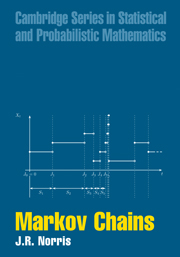5 - Applications
Published online by Cambridge University Press: 05 June 2012
Summary
Applications of Markov chains arise in many different areas. Some have already appeared to illustrate the theory, from games of chance to the evolution of populations, from calculating the fair price for a random reward to calculating the probability that an absent-minded professor is caught without an umbrella. In a real-world problem involving random processes you should always look for Markov chains. They are often easy to spot. Once a Markov chain is identified, there is a qualitative theory which limits the sorts of behaviour that can occur – we know, for example, that every state is either recurrent or transient. There are also good computational methods – for hitting probabilities and expected rewards, and for long-run behaviour via invariant distributions.
In this chapter we shall look at five areas of application in detail: biological models, queueing models, resource management models, Markov decision processes and Markov chain Monte Carlo. In each case our aim is to provide an introduction rather than a systematic account or survey of the field. References to books for further reading are given in each section.
Markov chains in biology
Randomness is often an appropriate model for systems of high complexity, such as are often found in biology. We have already illustrated some aspects of the theory by simple models with a biological interpretation. See Example 1.1.5 (virus), Exercise 1.1.6 (octopus), Example 1.3.4 (birth-and-death chain) and Exercise 2.5.1 (bacteria).
- Type
- Chapter
- Information
- Markov Chains , pp. 170 - 216Publisher: Cambridge University PressPrint publication year: 1997

